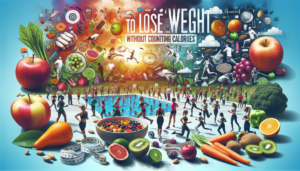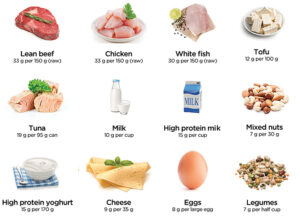
I hear this question all the time..
“Max, how can I lose weight without counting calories?!”
If you’re trying to lose weight, counting calories has become pretty common advice.
But look – I get it, counting calories can suck sometimes!
It takes extra time and effort, and sometimes you just don’t want to do maths when you’re thinking about what to have for dinner!
The good news is, yes – I can show you how to lose weight without calorie counting.
Let me start by saying that I do think most people should try some form of food monitoring for at least 30 days. It’s the best way to really understand how much you’re actually eating, what proper portion sizes look like, and what changes you’ll need to make to see the progress you want.
Personally, I’ve always viewed ‘a good diet’ as being able to eat intuitively without having to track everything. That’s why I don’t count calories anymore – I used to do it for years, but now I can just build meals pretty close to what I need to, and combined with an active lifestyle it’s enough to maintain my body weight.
But I get it, some people just hate tracking calories. And while calorie counting is absolutely a valuable tool to use if your goal is weight loss, you can still achieve your weight loss goals without counting calories!
There’s More to Weight Loss than Calories
So if you want to lose weight, but you don’t want to count calories, here’s how you do it!

Shifting your focus to whole whole foods, fruits, vegetables, and balanced nutrients is a solid strategy for weight loss. This not only aligns with ensuring an energy deficit, essential for losing weight, but also champions a lifestyle steeped in mindful eating and healthy habits without the stress of meticulous calorie tracking.
I’d argue that long term this is a more sustainable and holistic approach than counting calories anyway!
Also, the truth is weight loss requires more than just diet adjustments; it involves integrating high protein intake, prioritising sleep, and improving your relationship with physical activity. These strategies underscore the importance of a holistic approach to weight management, promising a sustainable path to achieving health goals.
Understanding the Role of Mindful Eating

Mindful eating is more than just a technique; it’s a mindset that aligns with a lifestyle of awareness and self-care. By paying close attention to the sensations and experiences of eating, you can foster a healthier relationship with food. This practice involves recognising your physical hunger and fullness cues, which can help prevent overeating and reduce binge eating episodes.
It’s about experiencing food more intensely without distraction, which not only enhances your enjoyment but also allows you to be fully present with your eating habits.
Key Practices of Mindful Eating
- Start with Your Senses: Before you begin eating, take a moment to appreciate the appearance and smell of your food. This can help you connect more deeply with the experience of eating.
- Eat Slowly: Take the time to chew your food thoroughly, which aids in digestion and can help you better recognize your body’s fullness signals.
- Assess Your Hunger: Use the Hunger Scale to evaluate how hungry you are before you start eating, and aim to stop eating when you’re comfortably full.
- Minimise Distractions: Turn off the TV and put away your phone. Eating without distractions helps you focus on the meal and your body’s cues.
Benefits of Mindful Eating
- Reduces Overeating: By eating slowly and recognizing fullness cues, you can avoid consuming more calories than your body needs.
- Supports Weight Management: Mindful eating helps distinguish between true hunger and emotional eating, aiding in weight loss and preventing weight gain.
- Enhances Food Enjoyance: Focusing on the flavours and textures of your food can make meals more satisfying and enjoyable.
Mindful eating is not just about weight loss; it’s about establishing a healthier, more conscious approach to eating. By integrating these practices into your daily routine, you can improve your overall well-being and develop a more positive relationship with food.
Incorporating High Protein and Fibre-Rich Foods

- Boost Your Protein: To enhance satiety (how full you feel after eating) and reduce overall calorie intake, include a protein source in each meal. Protein is crucial as it helps prevent muscle loss and metabolic slowdown during weight loss, ensuring that the weight lost is primarily body fat.
- Optimal Protein for Weight Loss: Aim for a protein intake of about 30% of total calories, which translates to approximately 150 grams on a 2000 calorie diet. This level of intake can lead to an automatic reduction in calorie consumption and make it easier to adhere to a healthy eating plan.
*I know, I know! I said this wasn’t about counting calories, so rather than tracking the amount of protein in grams or calories, aim for portions instead. 150 grams of protein can be achieved with 4-5 portions of protein per day. (My favourite strategy is to set someone up with 3 main meals, and 1-2 snacks, each one containing a protein source from the list below 🙂) - Protein-Rich Foods: Lean meats, fish, eggs, dairy, and legumes into your diet. These foods not only provide essential amino acids but also increase fat burning and muscle gain, contributing significantly to weight management. Whey protein is also a really convenient protein source, or consider a plant based protein powder for a vegan diet.
The Power of Fibre in your Diet for Weight Loss
 Incorporate Fibre-Rich Foods: Eating high-fibre foods like fruits, vegetables, whole grains, and legumes can regulate appetite and promote feelings of fullness. These foods are low in calorie density, which means you can feel fuller with fewer calories.
Incorporate Fibre-Rich Foods: Eating high-fibre foods like fruits, vegetables, whole grains, and legumes can regulate appetite and promote feelings of fullness. These foods are low in calorie density, which means you can feel fuller with fewer calories.
And yes, it also helps keep your toilet time more regular and pleasant!
Daily Fibre Goals: For optimal weight loss results, aim to consume at least 25-35 grams of fibre daily.
This intake helps reduce overall calorie absorption and supports a healthy digestive system.
My advice is to aim for 3-4 serves of fruit and vegetables per day, as well as whole grain forms of carbohydrates and you’ll have no issue getting enough fibre.
- Examples of Fiber-Rich Foods: Prioritise fresh vegetables, especially leafy greens like kale, cabbage, and spinach, as they are not only high in fibre but also rich in nutrients that support overall health and weight management.
Improving Your Relationship with Physical Activity Helps Weight Loss

Embrace a Variety of Physical Activities To Lose Weight
- Diversify Your Routine: Engage in activities that you enjoy. From team sports, to group gym sessions, to walking with a friend. This not only helps in burning calories but also keeps the exercise regimen enjoyable and sustainable.
- Incorporate Resistance Training: Build muscle to increase your resting metabolic rate, which helps in burning more calories even when you’re not actively working out. This can be achieved through weight training or bodyweight exercises.
- Increase Daily Movement: Boost your Non-Exercise Activity Thermogenesis (NEAT) by making small changes like taking the stairs instead of the elevator or parking farther from your destination. These simple modifications can significantly increase your daily energy expenditure.
Optimise Exercise for Better Health Outcomes
- Regular Aerobic and Strength Training: Combine aerobic exercises (like walking or cycling) with strength training to maximise fat loss and maintain muscle mass. Aim for at least 150 minutes of moderate aerobic activity or 75 minutes of vigorous activity each week.
Monitor and Adjust Your Physical Activity
- Set Realistic Goals: Start with achievable goals such as engaging in physical activity for 2-3 sessions per week and gradually increase the intensity and duration as your fitness improves.
- Listen to Your Body: Always be mindful of how your body responds to different activities and intensities. If you notice any discomfort or pain, adjust your exercise routine accordingly. Remember, consistency is key to long-term success and health benefits.
This is where speaking to someone who specialises in fitness can be a game-changer. You’ll see results much faster and avoid any aches and pains by making sure the exercise you’re doing is suitable for you and your goals.
Prioritising Sleep and Stress Management
 Optimise Your Sleep to Lose Weight
Optimise Your Sleep to Lose Weight
- Establish a Consistent Sleep Routine: Aim to go to bed and wake up at the same time every day to regulate your body’s internal clock, which can enhance sleep quality and duration.
- Create a Pre-Sleep Ritual: Engage in relaxing activities such as reading or taking a warm bath to signal to your body that it’s time to wind down. Avoid stimulating activities like work or using electronic devices.
- Optimise Your Sleep Environment: Keep your bedroom dark, quiet, and cool. Use blackout curtains and white noise machines if necessary to create an ideal sleeping environment.
Manage Stress to Support Healthy Weight
- Incorporate Relaxation Techniques: Regular practice of meditation, or deep breathing exercises can significantly reduce stress levels, helping to control cortisol and reduce cravings for unhealthy foods.
- Set Realistic Goals and Priorities: Focus on achievable goals to reduce the stress that often comes with unrealistic expectations. This can prevent stress eating and help maintain a healthy lifestyle.
- Seek Professional Help if Needed: Sometimes, professional intervention is necessary to manage stress effectively. Don’t hesitate to consult a therapist or counsellor if you find stress overwhelming.
Diet and Lifestyle Adjustments for Better Sleep and Stress Management
- Avoid Stimulants Close to Bedtime: Consuming caffeine or heavy meals can disrupt your sleep. Try to have your last caffeinated drink at least six hours before bedtime.
- Physical Activity: Regular physical activity can improve sleep and reduce stress. However, avoid vigorous exercise close to bedtime as it might have the opposite effect.
- Stay Connected: Maintaining social connections can help manage stress. Regular interactions with friends and family can provide emotional support and alleviate stress.
By prioritising quality sleep and effective stress management, you can enhance your overall health and support your weight loss efforts. Regularly practising these strategies can lead to better hormonal balance, reduced appetite for unhealthy foods, and improved energy levels, all of which are essential for maintaining a healthy weight.
Conclusion
So while counting calories continues to be a viable strategy for weight loss, it’s not the only strategy for weight loss.
We’ve highlighted the significance of fresh whole foods, healthy habits, and an integrated healthy lifestyle approach. These core principles serve as the foundation for not just losing weight but doing so in a manner that promotes overall well-being and long-term health.
Embracing mindful eating, incorporating high protein and fibre-rich foods, engaging in diverse physical activities, and prioritising sleep and stress management are all key components of a successful weight loss regime.
If you’re feeling stuck, I highly recommend you book a time to speak to a coach for a no-obligation chat about your health and fitness goals.
By making these habits part of your daily life, you can not only to achieve your weight loss objectives but also to enhance your quality of life significantly, proving that a comprehensive approach to weight management transcends the numbers on a scale.
FAQs
- Can weight loss be achieved without counting calories?
Yes, it is possible to lose weight without counting calories. A study published in JAMA in 2018 demonstrated that individuals who consumed fewer highly processed foods and more vegetables and whole foods lost more weight compared to those who strictly counted calories. - Is it possible to consume 1,200 calories daily and still not lose weight?
Yes, consuming 1,200 calories a day does not guarantee weight loss. Research indicates that weight loss involves more than just calorie intake and expenditure. The body may adjust its calorie burning rate based on the calorie intake, potentially slowing down weight loss even on a low-calorie diet. - Does reducing calorie intake lead to weight loss?
Weight loss occurs when you consume fewer calories than you burn. Historically, research has shown that a deficit of approximately 3,500 calories is needed to lose about one pound (0.45 kilogram) of fat. Therefore, eating fewer calories while increasing physical activity can lead to weight loss. - Should I focus on calorie counting or eating healthily?
Focusing on eating healthily rather than calorie counting is generally more beneficial for weight control. Calorie counting alone can prevent you from learning to recognize your body’s signals for hunger and fullness, which are crucial for maintaining a healthy weight.


